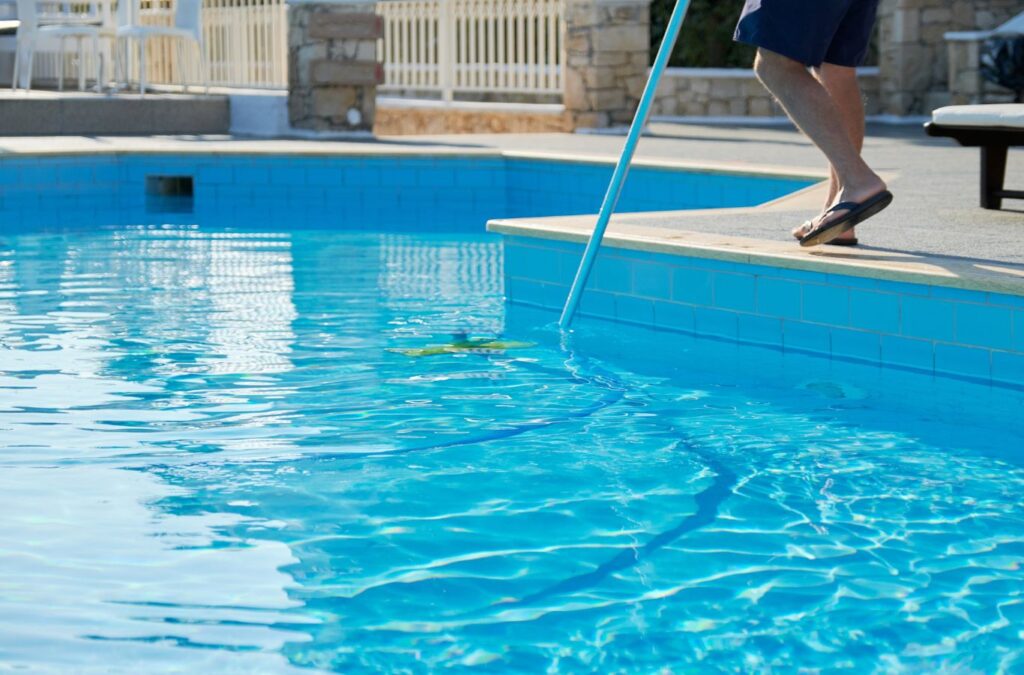
Owning a swimming pool comes with the joy of having your own oasis in the backyard, but it also comes with the responsibility of regular maintenance. Proper pool care ensures not only sparkling water but also a safe and enjoyable swimming environment for family and friends. Without routine upkeep, pools can quickly become breeding grounds for bacteria and algae, leading to expensive repairs down the road. If you’re a pool owner or considering becoming one, understanding the basics of pool maintenance is crucial.
Here are 5 essential pool maintenance tips that every homeowner should know:
1. Test and Balance Pool Water Regularly
Proper water chemistry is the foundation of good pool maintenance. Balanced pool water ensures that your pool is safe to swim in, prevents corrosion of equipment, and extends the life of your pool. There are three key components of water chemistry that you need to monitor:
- pH Levels: The pH level measures the acidity or alkalinity of the water. Ideally, your pool’s pH should be between 7.2 and 7.6. If the pH is too high, the water becomes too alkaline, leading to cloudy water and scaling on pool surfaces. If it’s too low, the water becomes too acidic, which can cause irritation to swimmers’ eyes and skin and damage your pool’s components.
- Alkalinity: Total alkalinity helps stabilize the pH levels. A proper range for total alkalinity is between 80 and 120 ppm (parts per million). Alkalinity prevents sudden shifts in pH, which can cause water imbalance issues.
- Chlorine Levels: Chlorine helps to disinfect the water by killing bacteria and preventing algae growth. Aim for a free chlorine level between 1 and 3 ppm to keep your pool water sanitized and clear.
To maintain these levels, it’s essential to test your pool water at least twice a week, especially during the summer months when the pool is used more frequently. You can use pool test strips or a liquid test kit, or consider hiring a professional service to ensure precise balance.
2. Skim, Brush, and Vacuum Your Pool Regularly
Debris such as leaves, bugs, and dirt can accumulate in your pool, affecting water clarity and promoting algae growth. Keeping the pool free of debris not only makes it more pleasant to swim in but also reduces the strain on your pool’s filtration system. There are three basic steps to keeping your pool clean:
- Skimming: Use a pool skimmer or leaf net to remove floating debris from the surface of your pool daily. Skimming prevents dirt and leaves from sinking to the bottom, where they become more challenging to remove.
- Brushing: Algae and grime can cling to the sides of your pool, especially in hard-to-reach areas such as steps and ladders. Brushing your pool walls, tiles, and floor weekly with a pool brush can help prevent algae buildup and keep your pool looking pristine. Use a brush appropriate for your pool type—nylon bristles for vinyl or fiberglass pools and steel bristles for concrete or plaster pools.
- Vacuuming: Even with regular skimming and brushing, dirt can still accumulate on the pool floor. Vacuuming your pool once a week helps remove this debris and improve water circulation. You can choose between manual vacuums, automatic pool cleaners, or robotic vacuums that do the work for you.
3. Keep Your Pool Filter Clean
Your pool’s filter system is responsible for removing dirt, debris, and impurities from the water. There are three common types of pool filters: sand filters, cartridge filters, and diatomaceous earth (DE) filters. Each type requires specific maintenance:
- Sand Filters: Sand filters trap debris in sand media. They need to be backwashed when the pressure gauge rises by 8-10 psi above normal, typically every 1-4 weeks depending on use. Every 5-7 years, the sand will need to be replaced.
- Cartridge Filters: Cartridge filters use a replaceable filter cartridge to capture dirt. These filters should be cleaned when the pressure gauge rises by 8-10 psi, or about every 4-6 weeks. The cartridge itself should be replaced annually or as needed.
- DE Filters: DE filters offer the finest filtration and capture even microscopic particles. They also need to be backwashed regularly when the pressure rises, and the DE powder should be replenished after each backwash. Every 6-12 months, the filter grid should be disassembled and thoroughly cleaned.
Failing to clean the pool filter as needed can reduce water circulation, increase strain on your pool pump, and ultimately result in cloudy or dirty water.
4. Maintain Proper Water Levels
Pool water levels can fluctuate due to evaporation, rainfall, or heavy pool usage. Keeping the water at the right level is important for your pool’s filtration system to function properly. The water should be high enough to cover the skimmer opening but not too high as to reduce the skimmer’s efficiency in trapping debris.
If the water level drops too low, it can damage your pool pump by causing it to run dry. Conversely, if the water level is too high, it prevents proper skimming, leaving debris floating on the surface. Make it a habit to check your pool’s water level at least once a week and top it off as necessary.
5. Shock Your Pool to Eliminate Contaminants
Even with regular chlorine maintenance, your pool can accumulate contaminants from swimmers, weather, and other environmental factors. Over time, chlorine can become less effective as it binds to organic material in the water, forming combined chlorine (chloramines), which are less effective at disinfecting the pool. Chloramines can also cause strong chlorine odors, eye irritation, and cloudy water.
To break down these contaminants and free up the chlorine, you’ll need to “shock” the pool. Shocking involves adding a higher-than-normal dose of chlorine or a non-chlorine shock treatment to the water to destroy contaminants. It’s best to shock your pool at night or during cooler periods to prevent sunlight from depleting the chlorine too quickly.
You should aim to shock your pool every 1-2 weeks, especially after heavy usage or storms. If your pool water appears cloudy or has a strong chlorine smell, it’s a sign that it might be time for a shock treatment.
Conclusion
Maintaining a pool doesn’t have to be a daunting task, but it does require consistency and attention to detail. By regularly testing your water, cleaning the pool, keeping your filters in good condition, maintaining proper water levels, and shocking the pool when necessary, you’ll ensure that your pool remains a safe, clean, and inviting place to swim all season long.
If you’re ever unsure about pool maintenance or find it overwhelming, consider hiring a professional pool service to help you manage the care of your pool. Professionals can provide expert advice and save you time and effort while ensuring your pool stays in top condition year-round.
By following these five essential tips, you can enjoy the benefits of a crystal-clear pool while extending the life of your pool equipment and saving on costly repairs down the line. Happy swimming!


